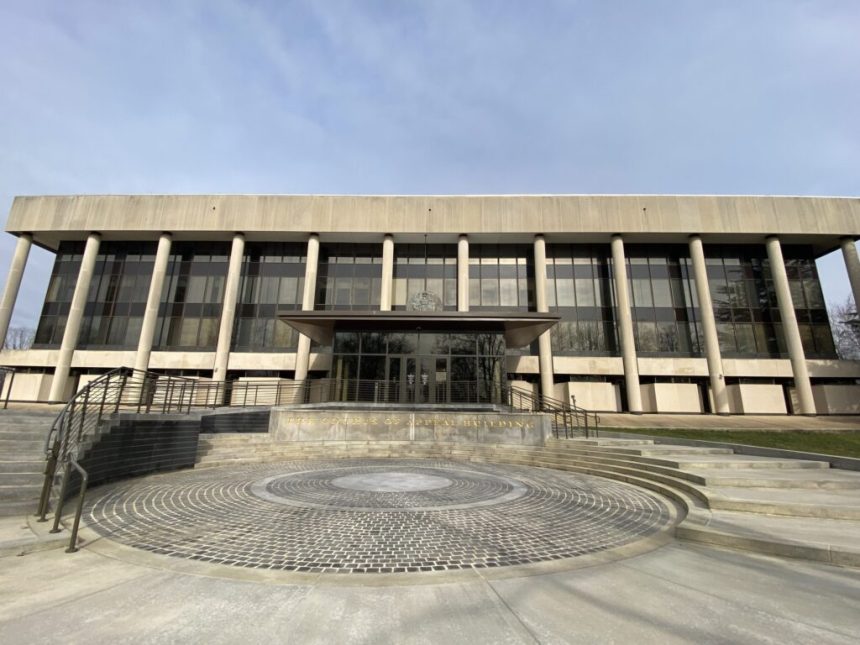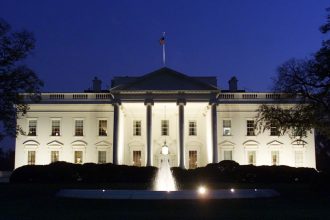The Maryland Supreme Court building in Annapolis. (File Photo by Bennett Leckrone/Maryland Matters)
Maryland Supreme Court justices had pointed questions Monday for a lawyer arguing that local governments do not exceed their authority by seeking damages from large fossil fuel companies for their role in climate change over the decades.
Vic Sher argued that lawsuits against the companies by Baltimore City, Annapolis and Anne Arundel County are not trying to restrict emissions, as the companies claim, but only to protect consumers from deceitful practices by corporations — an area of law “traditionally” policed by state courts, he said.
That brought pushback from Justice Brynja M. Booth.
“How can you say that when you are asking for punitive damages?” she asked.
But justices also grilled the attorney for the oil companies, asking how he squared his argument that only the federal government can regulate interstate — and international — greenhouse gas emissions, when supreme courts in Colorado and Hawaii have allowed similar suits to go forward.
The exchanges were part of an hourlong hearing Monday before the court, which is being asked to decide whether Baltimore, Annapolis and Anne Arundel County can move forward with their suits against the fossil fuel companies.
Lower courts, in separate rulings, said they could not, dismissing the lawsuits before trial after finding that the claims focused on the companies’ communications about greenhouse gas emissions that went beyond state borders, putting the issue outside the reach of state courts.
The Maryland suits are part of a wave of more than 30 similar lawsuits filed by cities and counties across the nation arguing that massive oil and gas companies, including Chevron, BP and ExxonMobil, knowingly deceived consumers about the globe-warming impacts of their products. In doing so, they harmed coastal cities like Baltimore and Annapolis, which stand to experience increased flooding and other dangers as seas rise and storms worsen, the suits claim.
Monday’s hearing was the latest in years of arguments in Maryland courts — the Baltimore case was originally filed in 2018, the Anne Arundel and Annapolis cases in 2021 — over whether the suits can be heard in state court. Monday was no different.
Theodore J. Boutrous, Jr., an attorney representing the Chevron Corp. and the other oil companies, argued that the greenhouse gas emissions at the center of the complaints fall under federal law and the regulatory jurisdiction of the Environmental Protection Agency. State courts, he said, are ill-equipped to handle such questions.
“They’re asking this court to take Maryland law and project it around the United States and around the world,” Boutrous said of the Maryland jurisdictions.
Boutrous contended that even if the cities and the county are not seeking to explicitly cap emissions, monetary damages could have the effect of constraining the companies’ activities.
“Damage awards have a regulatory effect,” Boutrous said. “They’re meant to change behavior.”
Allowing state courts to “indirectly regulate emissions” by imposing massive fines would intrude on the federal government’s authority over interstate air pollution, Boutrous argued.
Sher, for his part, argued that any lessening of emissions would come from economic forces.
“The only limitation will come from the market,” Sher said. “There is no regulation.”
That’s evidenced by the relief that the plaintiff jurisdictions are seeking, Sher said. Though the companies would pay punitive damages, there would be no “capping” or “enjoining” of their greenhouse gas emissions, Sher said. They could continue their practices — and pollution — unabated, he said.
SUPPORT: YOU MAKE OUR WORK POSSIBLE
The deception about climate change previously influenced the market, Sher said, and an award of damages to the cities and the county would set it right.
“It made a difference,” he said. “It had an effect on the world.”
Justices wondered whether the concerns about deceit in the marketplace could actually be separated from the concerns about air emissions. They also wondered whether companies had a duty to warn consumers about a global phenomena widely discussed for decades, and how more honest communications from the companies would have changed behavior specifically in Maryland.
But the panel also interjected with plenty of questions for Boutrous. They asked about the Hawaii and Colorado supreme court rulings that have allowed the climate cases to move forward in their courts. They also asked about Sher’s argument that only market forces would restrict emissions, not the court’s ruling.
“They’re using the lawsuit to try to change market forces to reduce emissions,” Boutrous said.
Boutrous also argued that it would be unwieldy for municipalities and counties across the United States to be permitted to move forward with litigation against the same large oil and gas companies.
“Think of the number of suits here,” Boutrous said.
He argued that if Maryland courts ruled that the companies should have warned the public, that outcome would have implications far beyond the state — even crossing international borders.
“This court would be imposing a duty that would run to China, to Great Britain — that would run all around the world,” Boutrous said.
But Sher argued that the nature of modern commerce means those effects are unavoidable.
“The notion that Maryland law cannot affect behavior outside of Maryland is wrong,” Sher said.









